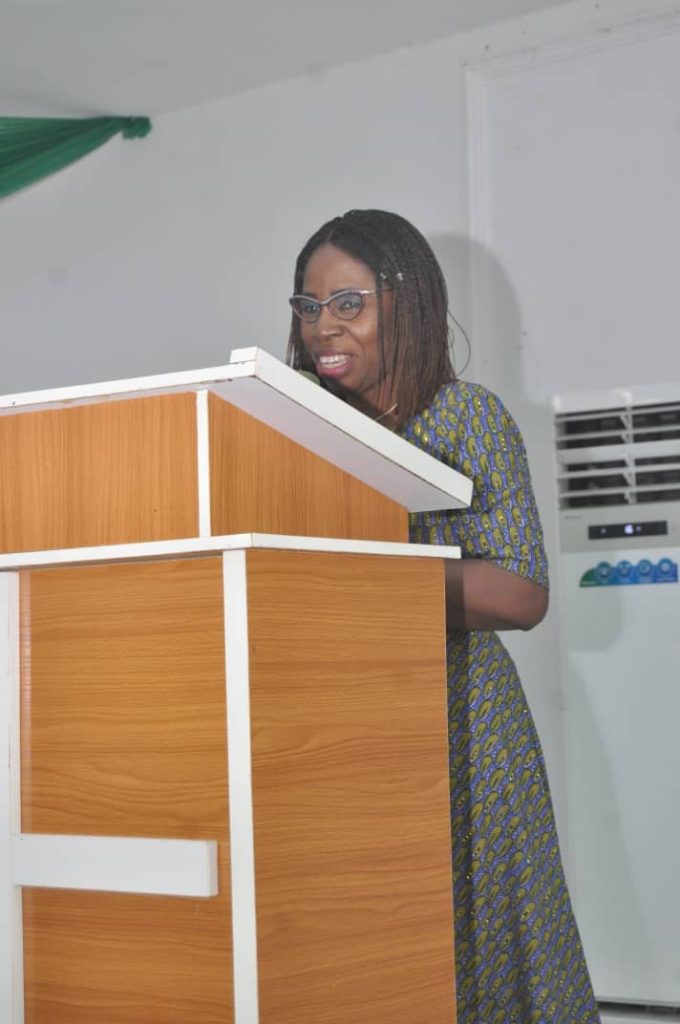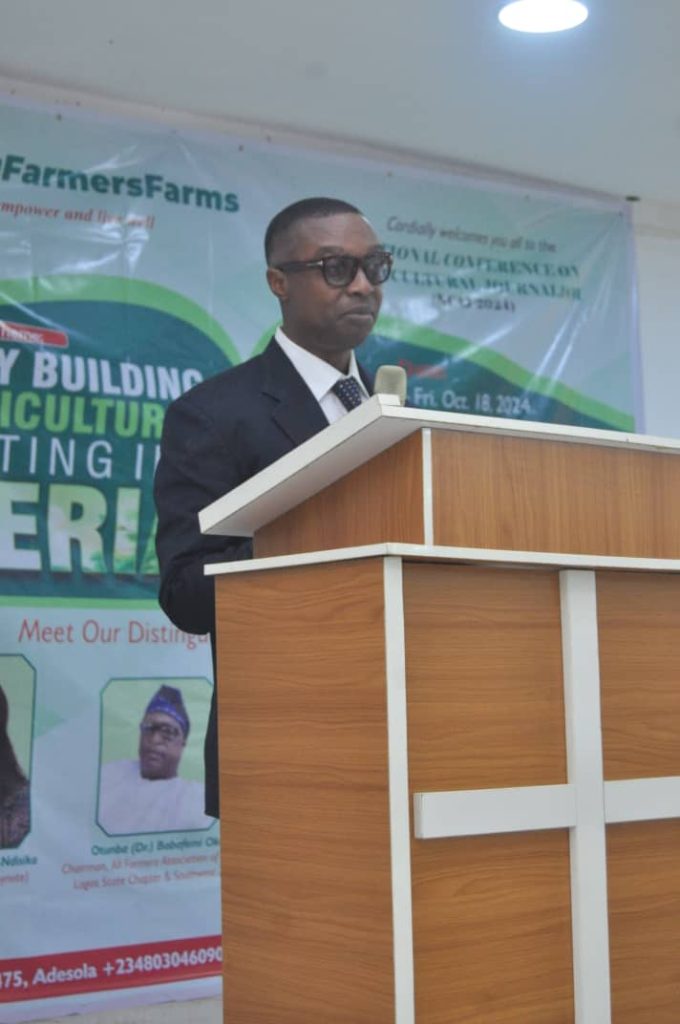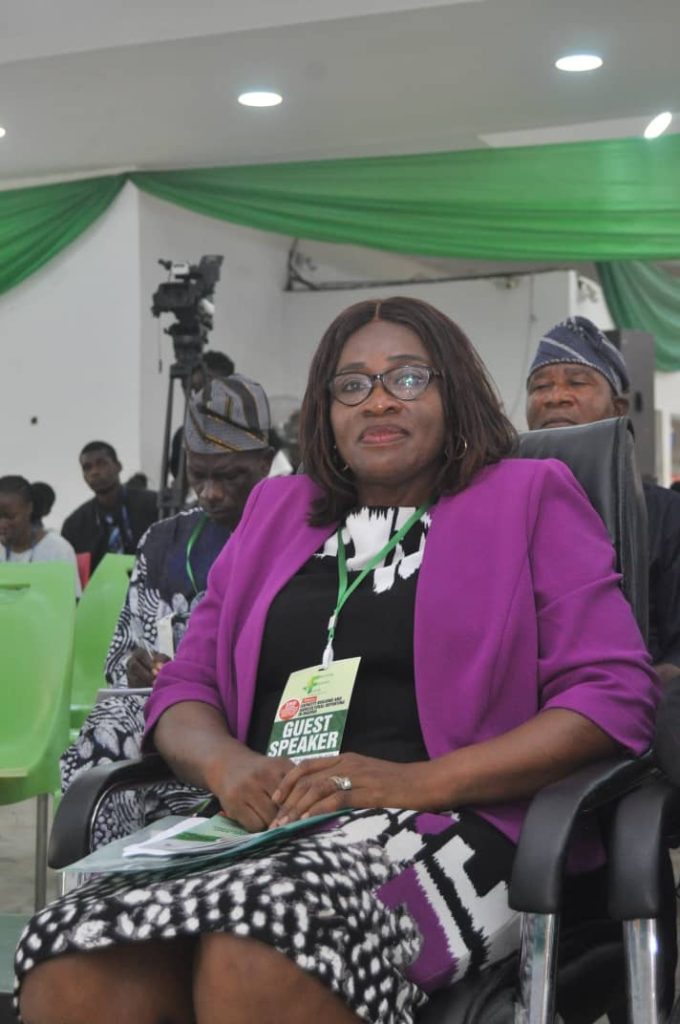The Federal Government has commended the specialised online newspaper, FarmingFarmersFarms for promoting agriculture, food security, and a safe environment. The government’s position was made known by the Minister of Environment, Malam Balarabe Abbas Lawal, at the opening ceremony of the second National Conference on Agricultural Journalism (NCAJ 2024) with the theme, ‘Capacity Building and Agricultural Reporting in Nigeria’, held at the Caleb University, Imota, Lagos State, Nigeria.
The minister, who was special guest of honour at the occasion, said the conference, which was organised by FarmingFarmersFarms, was timely and critically-relevant to our collective mission of strengthening the nation’s agriculture sector and improving food security. “I commend FarmingFarmersFarms (FFF) for recognising the vital role that agricultural reporting plays in the agriculture value chain. Agriculture remains the bedrock of Nigeria’s economy, providing sustenance for millions of people, creating employment, especially among the rural communities. Research institutes across the country have made continuous progress in agricultural research and innovations in crop improvement, soil health, livestock management, water conservation and sustainable pest control among others, but despite all these efforts, a significant gap still exist between research findings, commercialisation, and the actual adoption of new practices by farmers.
“The onus is on the agricultural journalist to bridge this gap through effective communication, in order to significantly enhance productivity and fully unlock the great potentials in the agriculture sector”, he added. The minister, who was represented by a Deputy Director in the ministry, Mrs. Abimbola Ibitayo, disclosed that the theme for this year’s conference clearly highlights the need for journalists to be adequately equipped to translate and communicate complex research findings into simple, actionable information that farmers across the nation can understand and apply, even in the rural areas. This requires, not only a deep understanding of the subject-matter, but also the ability to communicate through the platforms and channels that farmers trust and engage with, such as radio, local newspapers, mobile technology and social media handles.
Agricultural journalists can play the vital role of reporting success stories from new technologies, and highlighting the importance of public-private partnerships that enables the scaling of innovations. They can also create awareness of affordable, accessible solutions to showcase the tangible benefits of adopting these innovations. Successful agricultural reporting would inspire farmers’ buy-in and enhance adoption of modern techniques. It will also encourage the private sector investors to support the commercialisation of research outputs, saying in this era of rapid technological advancement, the use of digital platforms and mobile applications presents a powerful opportunity for agricultural journalists to enhance their reach and impact.

Lawal assured that the Federal Ministry of Environment was committed to supporting initiatives that embrace technology to improve agricultural communication and promote best practices, adding that sustainable farming practices and the circular economy have become two imperatives in the quest for long term success in the sector. The concept of the circular economy, which focuses on reducing waste, recycling resources, and regenerating natural ecosystems, must be a core part of our strategy and journalists have a critical roles to play in promoting the adoption of environmentally-sustainable farming practices. Therefore, through reporting, agricultural journalists can raise awareness about the adoption of farming practices that conserve water, improve soil health, reduce the reliance on harmful chemicals, promote agro-forestry systems, biodiversity conservation, and curb deforestation.
The minister said that the “Renewed Hope Agenda of President Bola Ahmed Tinubu’s administration places a strong emphasis on food security, as a key national priority. Achieving this goal requires concerted effort to close the gap between agricultural research and the practical realities faced by farmers. Agricultural journalists are uniquely positioned to drive this effort by disseminating knowledge, promoting innovation and encouraging the adoption of best farming practices needed, to improve productivity, increase their incomes, and contribute to the nation’s food security.
“I expect intense discussions focused on capacity building in agricultural reporting, trusting that journalists, through this conference, would be empowered with the right tools and skills they need to communicate effectively, so we can bridge the gap between research, commercialisation, farmer adoption and ultimately, achieve our shared goals of agricultural growth, improved yields, increased income, environmental sustainability, and food security. When the benefits of these innovations such as improved yields, better income, enhanced productivity and sustainability are clearly communicated, they become more attractive to farmers and other stakeholders”, the minister stated further.
During the conference, the Director of the Institute of Continuing Education (ICE), University of Lagos (UNILAG), Prof. Abigail Ogwezzy-Ndisika, stressed the vital role of agricultural journalism in shaping public perception of agriculture and food security, as well as bridging information gap between farmers, policy makers, consumers. Ogwezzy-Ndisika, while delivering her thought-provoking keynote lecture on ‘Cultivating Knowledge in the Agricultural Sector’, said capacity building and agricultural reporting in Nigeria would equip journalists with skills and knowledge for accurate reporting and fostering collaboration among stakeholders in agriculture and journalism.

On his part, the Vice-Chancellor of Caleb University, Prof. Nosa Owens-Ibie, noted that Nigerians needed to be equipped with proper information to boost agricultural output, noting that without agriculture, there is no life. “Agriculture is life and the way to go. Nigerians should think agriculture for the country to experience change economically”, he stated. The Chairman, Planning Committee for NCAJ 2024, Prof. Adesola Ajayi, reiterated that a lot had been achieved with agricultural journalism with publications geared towards solving challenges facing Nigeria and other parts of the world while the Editor-in-Chief of FFF, Dr. Adewale Kupoluyi, disclosed that the conference topics and resource persons were carefully-selected to make the desired impact in the area of agricultural journalism, as he expressed profound appreciation to individual and corporate supporters of the event.
Topics covered and resource persons at the conference are ‘Upscaling the Knowledge of Media Practitioners in Modern Agriculture Reporting’ by Dr. Solomon Oyeleye from Caleb University; ‘Teaching Journalists How to Avoid Legal Traps in Agricultural Journalism’, Barr. Wuraola Oyeniyi from the law firm of Duale, Ovia & Alex-Adedipe; ‘Identifying the Risks Associated with Coverage of Agriculture and Compensation Management’, Prof. Olalekan Asikhia, Deputy Vice-Chancellor, Research, Innovation, Strategy and Administration at Caleb University; ‘Promoting Research and Development in Food Security in Nigeria’, Otunba (Dr.) Babafemi Oke, Chairman, All Farmers Association of Nigeria (AFAN), Lagos State Chapter and South-West Zone, who was represented by his deputy, Mr. Shakin Agbayewa.
Panelists at the two-day event include Dr. Mutiu Ganiyu of the Department of Mass Communication, National Open University of Nigeria (NOUN); and Mr. Bonny Alaneme, science journalist, communication specialist and publisher, Africa Science & Tech Digest, Abuja; alongside Dr. Solomon Oyeleye, who examined ‘The State of Agriculture in Nigeria’ and ‘Future of Agriculture in Nigeria: The Role of Agricultural Journalism’, at the conference that was attended by journalists, government officials, academia, researchers, farmers, students, lawyers, and exhibitors, among others while the maiden edition of NCAJ 2023 was held at the Federal Capital Territory, Abuja with the theme, ‘Agricultural Journalism in Nigeria: Challenges and Prospects’.




1 Comment
Farming Farmers Farm is really doing a great job in Agricultural journalism